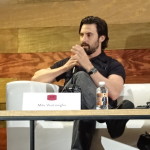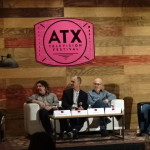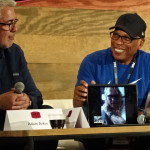Old TV shows not only don’t die anymore, they are often more appreciated now than they were during their original runs.
That axiom came to vivid life with the reunion of the cast of Syfy’s “Battlestar Galactica” on the closing night of the sixth edition of the ATX.Television Festival in Austin, Texas, which has made a name for itself in recent years by showcasing high-profile comebacks and launches of new programs.
The festival, which ran June 8-11, bills itself as “TV camp for grown-ups” and features a number of panels with cast and creators as well as screenings of classic, current and upcoming shows at venues around downtown Austin.
About 2,500 people attended this year’s fest, which was founded by Caitlin McFarland and Emily Gipson.
Adding to the buzz– by creating a literal roar on the streets — is the concurrent presence of the annual Republic of Texas Biker Rally, which draws thousands of motorcyclists from all over the country.
Among the new programs that were premiered at ATX, FX’s “Snowfall,” director John Singleton’s vision of the cocaine-fueled early 1980s in Los Angeles partially based on his experiences growing up in South-Central, Fox’s “Ghosted,” a single camera comedy starring Craig Robinson and Adam Scott as paranormal investigators, Freeform’s ”The Bold Type,” a look into the lives of the women running a global fashion magazine, Hulu’s “Cardinal,” an atmospheric thriller centering around the hunt for a serial killer, Netflix’s “Glow,” a comedy set in 1980s Los Angeles, truTV’s “I’m Sorry,” a family comedy based on creator and star Andrea Savage’s life as a wife, mother and comedy writer, AT&T Audience Network’s “Loudermilk,” starring Ron Livingston as a surly substance abuse advisor in a dark comedy directed by Peter Farrelly, NBC’s “Midnight, Texas,” a supernatural drama based on Charlaine Harris’s novels and Mark and Jay Duplass’s “Room 104,” titled after the hotel room in which all the action takes place and scheduled to premiere next month on HBO.
On the stage of the Paramount Theater, the “Battlestar Galactica” reunion brought together series creator Ronald D. Moore and beloved cast members Edward James Olmos, Mary McDonnell, Michael Trucco, Grace Park, Tricia Helfer, James Callis and Katee Sackhoff.
Their reminiscences about the show– itself a reboot of a 1978 series– that was created in a post-9/11 world and ended eight years ago culminated in a rousing audience call and response of “So Say We All,” the drama’s memorable catchphrase.
There was another huge television flashback when ATX featured the key cast of USA’s “Suits,” heading into its seventh season and its landmark 100 episode, in a dramatic and humorous live-read of the pilot episode. But oh, how these characters have grown in wisdom and experience, so there was a lot of improvisation thrown into the original script, read by actors including Gabriel Macht, Gina Torres, Patrick J. Adams, Meghan Markle, Rick Hoffman, Sarah Rafferty, Aaron Korsh and Abigail Spencer, who read numerous parts.
ATX also provided an overflowing buffet of riches for aficionados of dearly departed shows including “Sons of Anarchy,” “Alias,” “Girls,” “The Comeback” and “Designing Women,” with showrunners, writers and cast members divulging behind the scenes intrigue and comedic anecdotes from their respective productions.
Here are some of the other festival highlights:
More “Big Little Lies?”
There was speculation from an HBO executive that there could be a second season of the mini-series, even without some of the principals. Not only was “BLL” more popular than anticipated, book sales of Liane Moriarity’s novel went through the roof as Reese Witherspoon, Nicole Kidman, Shailene Woodley, Laura Dern, Adam Scott and Alexander Skarsgard acted out the darkly comic murder mystery in seven episodes earlier this year.
The Presidents (of the State of TV) Panel
 Prodded by Variety’s Debra Birnbaum, network chiefs Jennifer Salke (NBC), Casey Bloys (HBO), Craig Erwich (Hulu), Gary Levine (Showtime) and Nick Grad (FX) revealed their dream (network) presidential edicts. “A no-asshole policy,” Salke said. “Banning series orders off of pitches,” Levine said. “That everything become profitable,” Grad opined. And for Erwich, it was less swag and “no more fleece.”
Prodded by Variety’s Debra Birnbaum, network chiefs Jennifer Salke (NBC), Casey Bloys (HBO), Craig Erwich (Hulu), Gary Levine (Showtime) and Nick Grad (FX) revealed their dream (network) presidential edicts. “A no-asshole policy,” Salke said. “Banning series orders off of pitches,” Levine said. “That everything become profitable,” Grad opined. And for Erwich, it was less swag and “no more fleece.”
On a more serious note, Levine said he was proud of the breadth of Showtime’s programs from a global scale to intimate connections and name-checked shows which reflected that–“Billions,” “Shamless,” “Homeland” and “The Affair.”
Erwich, who was riding high of the critical acclaim for “The Handmaid’s Tale,” said he values relevancy both in business and creatively. “’Handmaid’s’ is galvanizing, sets a new bar and it is seeing us being talked about in a special way,” he said.
Salke noted that competitiveness aside, a breakout like “Handmaids” or “This Is Us” raises the bar for everyone. “These shows are contagious and bigger than themselves,” she said.
“I like a show that generates think pieces,” Bloys noted.
“The brass ring is still a long-running series,” Levine said. “Limited series may be undermining that—they’re a double-edged sword.”
“TV audiences love discovery,” Erwich said. “That’s why movie stars are not necessarily the recipe for success.”
All of the executives expressed admiration for and a sense of accomplishment in working with television’s top creators– and giving them creative freedom. “You have to earn their trust and create a safe space,” Erwich said. “You always have to remember it’s their show,” said Bloys.
This Is Us—The Whole Cast and Crew is So Kind
 A proud Salke also participated in the “This Is Us” panel, joining Milo Ventimiglia and executive producer Ken Olin in a discussion with Entertainment Weekly’s Henry Goldblatt of the unmitigated hit, which scored a second season pickup before the Season 1 finale aired. (Creator Dan Fogelman and series star Chrissy Metz were scheduled to attend, but couldn’t make the trip to ATX.)
A proud Salke also participated in the “This Is Us” panel, joining Milo Ventimiglia and executive producer Ken Olin in a discussion with Entertainment Weekly’s Henry Goldblatt of the unmitigated hit, which scored a second season pickup before the Season 1 finale aired. (Creator Dan Fogelman and series star Chrissy Metz were scheduled to attend, but couldn’t make the trip to ATX.)
“I dove right in to Jack,” Ventimiglia said about his character. ”It felt incredibly familiar and right and what I found is staying eye to eye with Mandy [Moore] feels natural. Jack is stoic. There are no tears. One of the highlights is the last episode and the fight with Mandy leading up to the poetic end.”
“Dan wanted no edits in that scene,” Olin said. “Mandy and Milo were rehearsed and ready. There were a couple of takes that were X-rated. There was so much at stake for Jack and Rebecca and all hands were on deck. Dan was really proud, because it’s only about the writing and acting. We are so used to seeing special effects [in other shows].”
Salke noted that Fogelman couldn’t attend because he was editing. The next season of “This Is Us”– encompassing 10 episodes – was moved to Tuesday nights as the Thursday slot would’ve run into the NFL, necessitating six episodes and then the show being off the air for two months.
“I love being part of something inspiring. Fans feel like they know this guy, like they’ve had dinner with him,” Ventimiglia said.
“You are the dream dad—and husband,” Salke interjected.
“Shows like this are once-in-a-lifetime,” she continued. “It’s magical. There is no way to copy it. They come from someone’s soul and experience. Other networks were like, ‘Where’s our ‘This Is Us?’”
“Everyone involved in it is an amazing human being, the whole group, including the crew,” Ventimiglia said.
“It’s an ensemble show. They are a troupe,” Salke noted. “It’s unusual – the quality of the piece is bigger than any individual, as well as the big heart behind the show. It’s amazing. It’s a subtle reminder that people live on – that’s the attraction,” she said, before promising that Season 2 will be even bigger but will maintain all of its authenticity and soulfulness.
“This is the most authentic group of people and the show doesn’t shy away from struggles to live good lives,” Olin said. “One quality is unique and special – kindness– and amazing that a show like this can be celebrated at this time.”
Understanding the Enemy, the Depiction of “The Other”
 You could call it “us again them,” but who are they, and what are they made of? Joel Field, Graham Yost and Joe Weisberg of “The Americans” and Ronald D. Moore (“Outlander,” “Battlestar Galactica”) bandied about the concept with moderator Eric Goldman of IGN TV.
You could call it “us again them,” but who are they, and what are they made of? Joel Field, Graham Yost and Joe Weisberg of “The Americans” and Ronald D. Moore (“Outlander,” “Battlestar Galactica”) bandied about the concept with moderator Eric Goldman of IGN TV.
Former company man—company, as in CIA—Weisberg, who created “The Americans,” said he read memoirs of KGB agents and re-thought the concept of “the enemy.” “I realized my thoughts were one-dimensional,” he said. “They were us.” He also noted that the KGB, unlike most Soviet institutions, was generally not corrupt.
Yost, who created “Justified,” spoke extensively about the character of Boyd Crowder in that series, played by Walton Goggins. “Even though he was ‘bad,’ in the Elmore Leonard tradition, if you like him, keep him around. It was what Walton brought to the character. We’d have him do something bad and the audience still loved him.”
Moore had a similar experience on “Outlander,” Starz’ time travel romance, with the double-duty character of Frank Randall and his ancestor, Capt. Jonathan “Black Jack” Wolverton Randall, both portrayed by Tobias Menzies.
“We wanted him to be an echo of Frank, not a monster. We had Tobias, like Walton,” Moore said.
Yost brought up another “bad” character, Giovanni Ribisi’s “Sneaky Pete,” which streams on Amazon. “Giovanni can be a bad guy but we go back to Bryan Cranston’s original pitch, ‘Breaking Good.’ You never quite know why he’s doing what he’s doing, because he’s a con man. But our guy does care about people’s lives. We don’t want to see him robbing widows. He’s out for guys worse than him. ”
“The studios and networks are still terrified of audiences not liking characters,” Moore said. “But I always go back to Tony Soprano taking his daughter to look at colleges and then killing guys in the afternoon.”
“Our whole show is about doing bad things. He cares, she doesn’t,” Weisberg said about Philip and Elizabeth Jennings, the Russian spy couple played by Matthew Rhys and Keri Russell.
Speaking of bad things, Yost said he started liking “Game of Thrones” when “Jaime [Lannister] pushed the kid out of the window – and then the development of Jaime’s character.”
Sons of Anarchy Ride Again
 Directors of the FX series Paris Barclay and Adam Arkin—and creator Kurt Sutter, via Skype, joined moderator Mandi Bierly of Yahoo to delve into some of the show’s key elements over its seven seasons, which wrapped in 2014.
Directors of the FX series Paris Barclay and Adam Arkin—and creator Kurt Sutter, via Skype, joined moderator Mandi Bierly of Yahoo to delve into some of the show’s key elements over its seven seasons, which wrapped in 2014.
“I sent angry emails to everyone, which set the tone for the rest of my career,” Sutter began, alluding to his bad-boy persona. “I had an idea, and I try to surround myself with people who know more than I do. Some of it works, some of it doesn’t. We didn’t find the rhythm until more than halfway through the first season. There was a mandate at the time to be more standalone. I didn’t know quite how to do that. I tried early on, but the serialization got so deep that by episode five or six they took the handcuffs off. By episode seven there’s no turning back for Tara and Jax. I could focus on the characters and the humor. Not that it was a mistake [to have closed-ended episodes], but that’s when it clicked in.”
Arkin, who also acted in the show in a supporting role, talked about directing the episode which depicted Opie’s death. “I was really honored to be given that opportunity. It was beautifully executed. I knew it was going to be traumatic,” he said. “It was an emotional experience for everyone, more for the company than me, but partially my responsibility.”
“That was one of my favorite murders,” said Barclay, who along with being an EP on “Sons” is president of the DGA. “There was a lot of emotion and he did it better than I could’ve done it. They trusted him.”
The conversation turned to the consummation of the relationship between Tig (Kim Coates) and Venus (Goggins again.) “Getting the breasts right for Venus was the hardest thing,” Barclay recalled. “They cost $6,000 a pair and don’t last for very long. It was extraordinary what it did for Walton. He’d say, ‘I’d fuck me.’ They both went all in. It was emotional and the crew applauded for a full minute and this was not a crew tuned in to gay or trans issues.”
“Walton was immersed and found a bottomless well of compassion,” Arkin said about the actor’s portrayal of a transgender prostitute.
The main themes of the show were family and brotherhood. “In the second season, they started to become bikers. It made it easier for the director,” Barclay said. “The glue came from Charlie [Hunnam]. He was incredibly admired. We had a couple of conflicts. I once said something to him roughly because I was tired—and gay. Every episode we had a table read and he would warn them if someone would die at the end. Sometimes we come to set and we don’t acknowledge how much work the actors have already done. When I became a producer, I thought of pacing him and giving him three days off.”
Barclay also reminisced about Hunnam’s sex scenes. “They were stress-free – and hilarious. We’d have long conversations about Charlie’s sock and a crazy-ass dance over the pasties for the women.”
The Definition of a Network
From the starting point of the old tagline “It’s not TV, it’s HBO,” network execs Kathleen McCaffrey (HBO), Nick Hall (Amazon Studios), Grant Gish (Marvel Television), Bryan Seabury (CBS Television Studios) and Karey Burke (Freeform) joined THR’s Dan Fienberg in coming up with essential attributes on what defines networks these days.
“It’s quality, not quantity,” McCaffrey said. “For HBO, the throughline is quality. Richard Plepler (HBO’s chairman and CEO) says we want to win the vote every Sunday night.”
“Cool shit for baller women” is how Burke defined the internal slogan for Freeform, recently rebranded from ABC Family. “ABC Family didn’t reflect our average viewer, who is a 26-year-old woman.”
As for Netflix, the slogan might be “We’re the place that has 30 shows premiering next week,” Fienberg suggested.
Gish talked about how Marvel has shows for all four quadrants, and on networks including Netflix, Hulu and ABC. “Hashtag, it’s all connected,” he said. “You need to stay true to character, the IP and the comics. Marvel has 11,000 characters.”
But when it comes down to it, it’s all about the shows.
“People are still talking about ‘The Sopranos’ finale 10 years later,” McCaffrey said. “We are developing high-quality material. ‘Big Little Lies’ was the biggest show for women since ‘Sex and the City.’ ‘Ballers’ is the biggest half-hour. We stick with our people and our creators, like David Simon, who is doing a new show [“The Deuce”] with James Franco and Maggie Gyllenhaal. We still prioritize watching on TV,” she said, despite the ubiquity of second screens.

